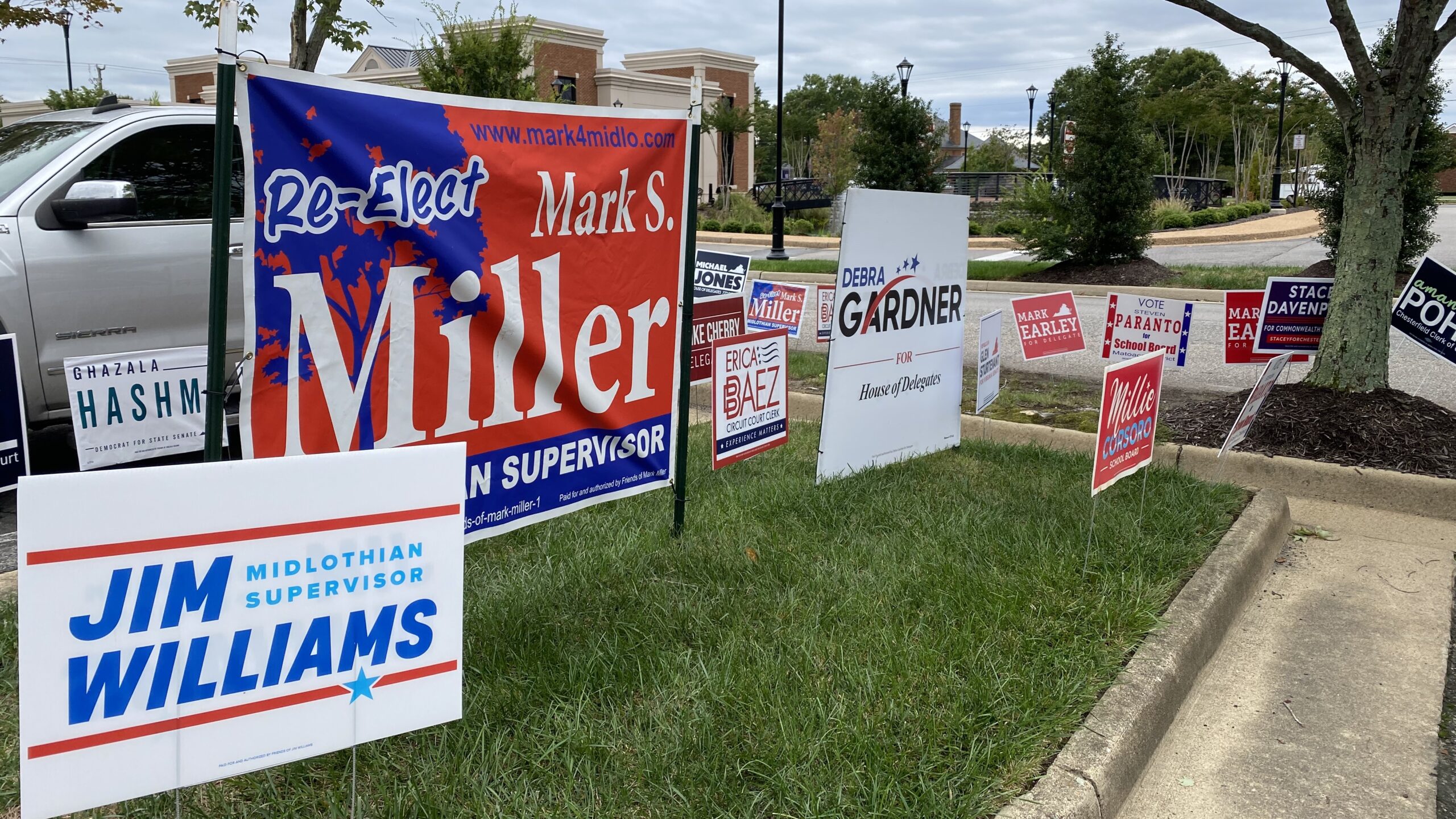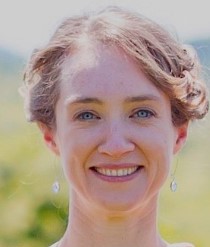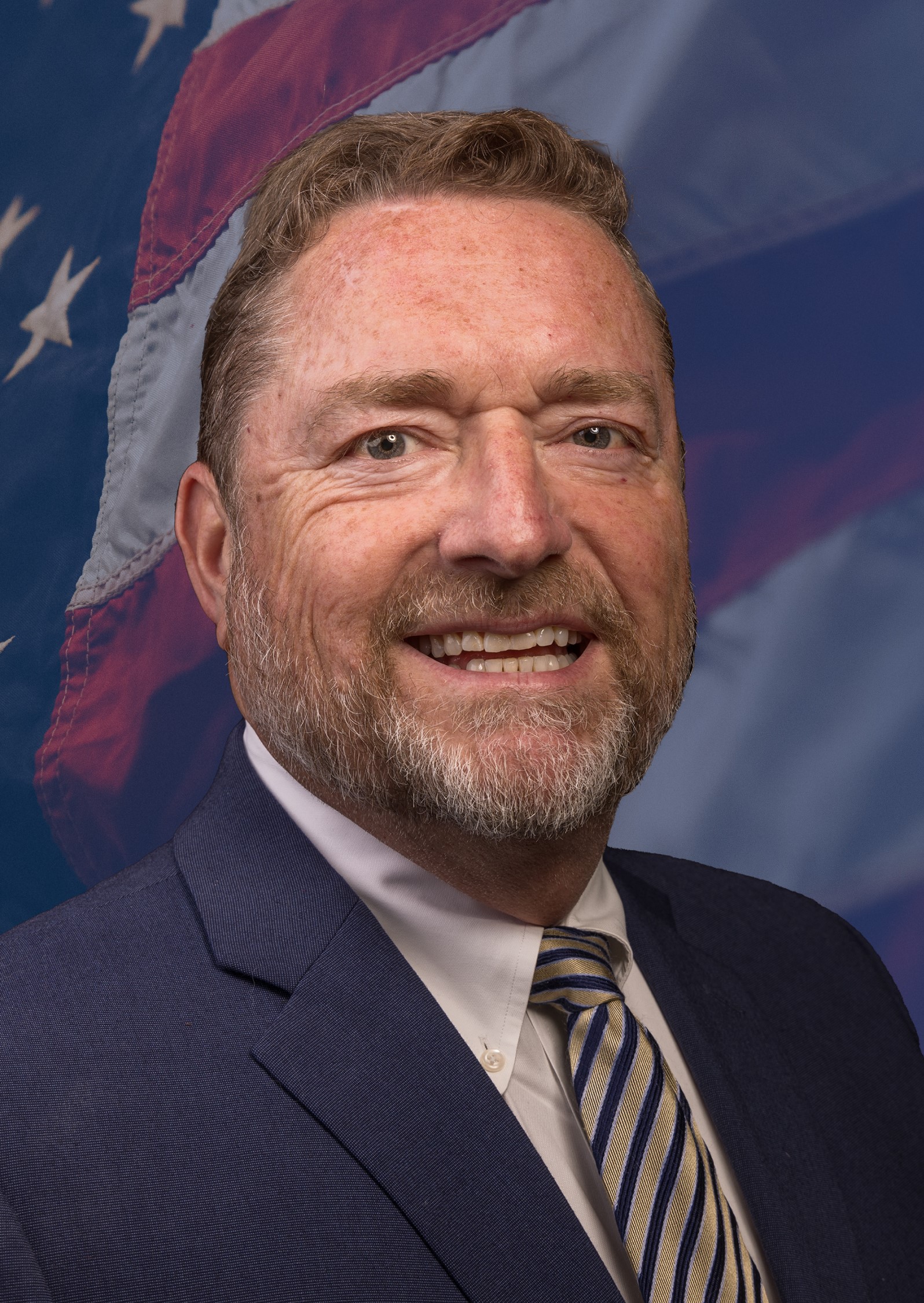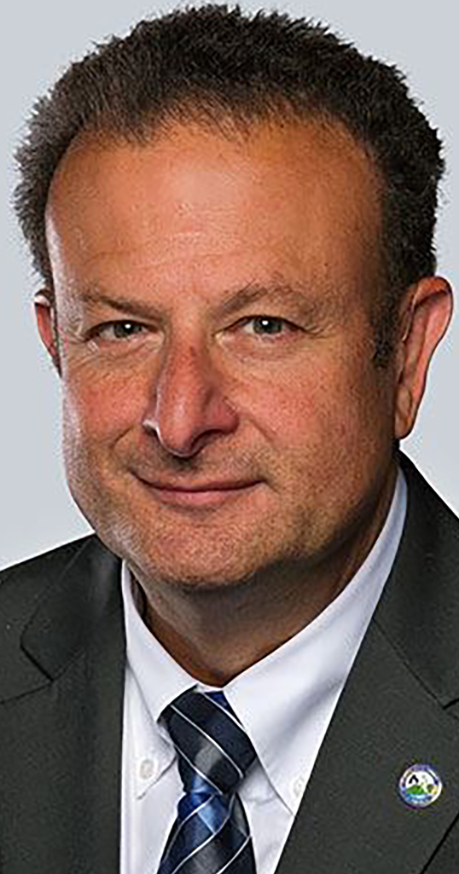
Mark Miller, Jim Williams and Erin Phelan are candidates for the Midlothian seat on the Chesterfield Board of Supervisors. (Jack Jacobs photo)
Editor’s note: This is the second in a series of discussions with the candidates vying for seats on Chesterfield County’s Board of Supervisors. Four of the five districts are contested going into next month’s election.
A relatively new incumbent is aiming to fend off two opponents in the race for the Midlothian district seat on the Chesterfield County Board of Supervisors.
Democrat Mark Miller has been in office for 11 months after winning a special election last year. He is again on the campaign trail to protect his seat from challengers Jim Williams and Erin Phelan.
The three candidates offer differing visions for business-related taxes levied in the county.
Williams, who is carrying the Republican banner in the race, would work to create a lower tax bill for small businesses if he were to win the seat.
“I’m a small businessman myself and I think there needs to be more small businesses in Chesterfield County,” said Williams, who is a personal injury lawyer. “My goal would be to make the environment as business friendly as possible.”
Williams said he would be in favor of raising the gross receipts threshold at which Chesterfield collects its business professional and occupational license tax (BPOL), which the county has done a couple times in recent years. Currently, Chesterfield’s threshold is $500,000.
He said he would be against raising any taxes, or creating a meals tax.
Miller, who works as a counselor at Brightpoint Community College, said he would be open to a BPOL threshold increase. He said he would also be willing to consider implementation of a meals tax, though he said it’d be important to factor in how the revenue would be utilized and would want it to be earmarked for a specific purpose.
Phelan, an independent candidate who works as a project manager for construction and engineering company Fluor, said she would like to see the county raise its current tax rate on data center equipment, now 24 cents per $100 of assessed value. In 2019, the county slashed the rate by about 87 percent to its current rate as an incentive for data centers.
“The county will say that, for example, we need to broaden the tax base beyond just being residential, and I get that, but it’s hard to square a statement like that when you look at the low tax rates that data centers get,” Phelan said.
She would want to examine the county’s incentives policies geared toward large projects and firms, saying resources should be rerouted toward smaller businesses.
Phelan didn’t express strong feelings about an adjustment to the BPOL threshold. She doesn’t support a meals tax.
On growth, Miller said he was supportive of mixed-use redevelopment of aging commercial centers in his district, and pointed to Sauer Properties’ plans to add apartments to its retail center formerly called Stein Mart Festival, as the right kind of project to revitalize shopping centers.
“I’m open to creativity and quality,” he said.
Miller said he felt that generally the rate of residential development in the county is too fast and he felt too many exemptions were being granted for rezoning cases.
“I see myself as a bridge between what the developer’s proposal is going to be and communicating it to those I represent. There’s no question in my mind that just because we can do something doesn’t mean we should do something,” he said.
Miller said the key to managing the tempo of growth in Chesterfield is closer scrutiny of projects as they make their way through the county’s approval processes.
“We need to make sure it’s a good quality project that adds to the community,” he said. “We need to make sure we’re looking very closely at each specific project and how it’ll impact schools and how it’ll affect infrastructure.”
That interest in a thorough review extends to Miller’s outlook on Chesterfield’s ongoing zoning ordinance update. He said that while the ordinance is out of date and in need of a refresh, he was also wary of tweaks to streamline the ordinance for fear that too easy a process would be a detriment to managing growth.
“I don’t want integrity to be second to efficiency,” Miller said.
Phelan said she wanted to bring a methodical approach to growth, and would want to see infrastructure in place ahead of new development.
“My inclination is to plan, execute and monitor in a way that’s balanced but also proactive,” she said. “What I see is the county being very zealous in encouraging businesses to locate here.”
Phelan would be open to pausing the update to the zoning ordinance in order to wait for the regular update to the comprehensive plan to take place.
“Practically speaking, the comprehensive plan should come first,” she said.
State law requires a locality’s long-range plan to map out growth and development to be updated at least once every five years.

Erin Phelan, 2023 candidate in race for Midlothian seat on Board of Supervisors. (Courtesy Erin Phelan campaign)
Phelan wants to see how the county could expand its cash proffer program, which is currently limited to funding transportation projects.
“I feel like that has unnecessarily limited what can be done when new developments are made. I would like to see what the possibilities are for expanding that scope,” she said.
Williams also voiced interest in a cautious approach to development. He said that what he’s heard from voters is a general concern about traffic and development in the county, and that he is in favor of taking a harder look at development proposals that come across the board’s desk and feels like more can be done to follow the guidance of the county’s comprehensive plan.
“What I’m constantly hearing when canvassing neighborhoods is people are concerned about traffic and the amount of development,” he said. “God only made but so much dirt. … We need to stick to the comprehensive plan. We can’t have development be willy-nilly in Chesterfield.”
One pending development proposal would allow the Board of Supervisors the ability to consider zoning requests to establish public roads to residential projects in areas with the agricultural (A) zoning designation. Such a proposal was voted down by the current board earlier this year, but a similar pitch is expected to return to the board’s consideration at some point.
Currently, Chesterfield’s ordinance prohibits the extension or creation of a road for a residential development in agriculturally zoned areas. The proposal to reverse that policy has been pitched as a tool to address demand for homes on large lots in rural settings.
Phelan said that she was generally opposed to the idea of allowing the board to consider zoning requests to build public roads on agricultural land to serve housing developments.
“I would have to really see it but, first impression, I would not favor something like that,” she said.
Williams’ stance on the topic was similar to Phelan’s, while Miller said more work was needed on the proposal, and that he was interested in what staff’s latest iteration on the idea will be.
“I’d like to see how they tweak it. The way it was, I think we as a board recognized there was more work to do on that. I look forward to seeing it and what they come back with,” Miller said.
Miller, Williams and Phelan all expressed interest in providing an opportunity for an operator to come forward with a proposal to bring racing back to Southside Speedway, which is subject to a request-for-proposals solicitation.
“We have to make sure it can sustain itself,” Williams said, echoing similar sentiments from Miller and Phelan.
For her part, Phelan, a cycling enthusiast, suggested a different kind of racing could take root at the Southside Speedway property in place of auto races.
“I would prefer a more environmentally sustainable use for that property. To capitalize on the popularity of cycling in our region and expand access to the sport, a cycling event space such as a velodrome would be an ideal and very unique use of this property that could be a real standout attraction for our area,” she said.
Miller has held office for about a year, after winning a special election for the seat in November 2022 to finish out the term of Leslie Haley. Supervisors are elected to four-year terms.
Election Day is Nov. 7. Early in-person voting is ongoing.

Mark Miller, Jim Williams and Erin Phelan are candidates for the Midlothian seat on the Chesterfield Board of Supervisors. (Jack Jacobs photo)
Editor’s note: This is the second in a series of discussions with the candidates vying for seats on Chesterfield County’s Board of Supervisors. Four of the five districts are contested going into next month’s election.
A relatively new incumbent is aiming to fend off two opponents in the race for the Midlothian district seat on the Chesterfield County Board of Supervisors.
Democrat Mark Miller has been in office for 11 months after winning a special election last year. He is again on the campaign trail to protect his seat from challengers Jim Williams and Erin Phelan.
The three candidates offer differing visions for business-related taxes levied in the county.
Williams, who is carrying the Republican banner in the race, would work to create a lower tax bill for small businesses if he were to win the seat.
“I’m a small businessman myself and I think there needs to be more small businesses in Chesterfield County,” said Williams, who is a personal injury lawyer. “My goal would be to make the environment as business friendly as possible.”
Williams said he would be in favor of raising the gross receipts threshold at which Chesterfield collects its business professional and occupational license tax (BPOL), which the county has done a couple times in recent years. Currently, Chesterfield’s threshold is $500,000.
He said he would be against raising any taxes, or creating a meals tax.
Miller, who works as a counselor at Brightpoint Community College, said he would be open to a BPOL threshold increase. He said he would also be willing to consider implementation of a meals tax, though he said it’d be important to factor in how the revenue would be utilized and would want it to be earmarked for a specific purpose.
Phelan, an independent candidate who works as a project manager for construction and engineering company Fluor, said she would like to see the county raise its current tax rate on data center equipment, now 24 cents per $100 of assessed value. In 2019, the county slashed the rate by about 87 percent to its current rate as an incentive for data centers.
“The county will say that, for example, we need to broaden the tax base beyond just being residential, and I get that, but it’s hard to square a statement like that when you look at the low tax rates that data centers get,” Phelan said.
She would want to examine the county’s incentives policies geared toward large projects and firms, saying resources should be rerouted toward smaller businesses.
Phelan didn’t express strong feelings about an adjustment to the BPOL threshold. She doesn’t support a meals tax.
On growth, Miller said he was supportive of mixed-use redevelopment of aging commercial centers in his district, and pointed to Sauer Properties’ plans to add apartments to its retail center formerly called Stein Mart Festival, as the right kind of project to revitalize shopping centers.
“I’m open to creativity and quality,” he said.
Miller said he felt that generally the rate of residential development in the county is too fast and he felt too many exemptions were being granted for rezoning cases.
“I see myself as a bridge between what the developer’s proposal is going to be and communicating it to those I represent. There’s no question in my mind that just because we can do something doesn’t mean we should do something,” he said.
Miller said the key to managing the tempo of growth in Chesterfield is closer scrutiny of projects as they make their way through the county’s approval processes.
“We need to make sure it’s a good quality project that adds to the community,” he said. “We need to make sure we’re looking very closely at each specific project and how it’ll impact schools and how it’ll affect infrastructure.”
That interest in a thorough review extends to Miller’s outlook on Chesterfield’s ongoing zoning ordinance update. He said that while the ordinance is out of date and in need of a refresh, he was also wary of tweaks to streamline the ordinance for fear that too easy a process would be a detriment to managing growth.
“I don’t want integrity to be second to efficiency,” Miller said.
Phelan said she wanted to bring a methodical approach to growth, and would want to see infrastructure in place ahead of new development.
“My inclination is to plan, execute and monitor in a way that’s balanced but also proactive,” she said. “What I see is the county being very zealous in encouraging businesses to locate here.”
Phelan would be open to pausing the update to the zoning ordinance in order to wait for the regular update to the comprehensive plan to take place.
“Practically speaking, the comprehensive plan should come first,” she said.
State law requires a locality’s long-range plan to map out growth and development to be updated at least once every five years.

Erin Phelan, 2023 candidate in race for Midlothian seat on Board of Supervisors. (Courtesy Erin Phelan campaign)
Phelan wants to see how the county could expand its cash proffer program, which is currently limited to funding transportation projects.
“I feel like that has unnecessarily limited what can be done when new developments are made. I would like to see what the possibilities are for expanding that scope,” she said.
Williams also voiced interest in a cautious approach to development. He said that what he’s heard from voters is a general concern about traffic and development in the county, and that he is in favor of taking a harder look at development proposals that come across the board’s desk and feels like more can be done to follow the guidance of the county’s comprehensive plan.
“What I’m constantly hearing when canvassing neighborhoods is people are concerned about traffic and the amount of development,” he said. “God only made but so much dirt. … We need to stick to the comprehensive plan. We can’t have development be willy-nilly in Chesterfield.”
One pending development proposal would allow the Board of Supervisors the ability to consider zoning requests to establish public roads to residential projects in areas with the agricultural (A) zoning designation. Such a proposal was voted down by the current board earlier this year, but a similar pitch is expected to return to the board’s consideration at some point.
Currently, Chesterfield’s ordinance prohibits the extension or creation of a road for a residential development in agriculturally zoned areas. The proposal to reverse that policy has been pitched as a tool to address demand for homes on large lots in rural settings.
Phelan said that she was generally opposed to the idea of allowing the board to consider zoning requests to build public roads on agricultural land to serve housing developments.
“I would have to really see it but, first impression, I would not favor something like that,” she said.
Williams’ stance on the topic was similar to Phelan’s, while Miller said more work was needed on the proposal, and that he was interested in what staff’s latest iteration on the idea will be.
“I’d like to see how they tweak it. The way it was, I think we as a board recognized there was more work to do on that. I look forward to seeing it and what they come back with,” Miller said.
Miller, Williams and Phelan all expressed interest in providing an opportunity for an operator to come forward with a proposal to bring racing back to Southside Speedway, which is subject to a request-for-proposals solicitation.
“We have to make sure it can sustain itself,” Williams said, echoing similar sentiments from Miller and Phelan.
For her part, Phelan, a cycling enthusiast, suggested a different kind of racing could take root at the Southside Speedway property in place of auto races.
“I would prefer a more environmentally sustainable use for that property. To capitalize on the popularity of cycling in our region and expand access to the sport, a cycling event space such as a velodrome would be an ideal and very unique use of this property that could be a real standout attraction for our area,” she said.
Miller has held office for about a year, after winning a special election for the seat in November 2022 to finish out the term of Leslie Haley. Supervisors are elected to four-year terms.
Election Day is Nov. 7. Early in-person voting is ongoing.





Most Chesterfield residents that oppose its current annual population growth would be surprised to learn that the rate is about 1.5%. They think it’s much higher. The two biggest detriments to growth are traffic and the cost of school construction. The biggest contributor to each of those is the modern day single family cul de sac subdivision, population growth that crowds existing schools and requires more than one vehicle per household (often 3-4!). Unfortunately, it’s the kind of housing nearly all of us aspire to own. Multi-family growth, usually high density in-fill and built on a major thoroughfare, has little… Read more »
We are seeing a trend in my district toward Townhomes with 3-4 BR which is a good size for families too as that’s similar to Single Family buildouts in similar price points. Would not those townhouses have 3 or 4 cars too for residents with children?
Bruce, we think it’s higher because it is. The year-over-year population in Chesterfield grew by 3.5% in 2020, 1.5% in 2021, and 1.9% in 2022. A three-year average of 2.3%. This is before all the Multifamily units get filled. Keep in mind, that the comprehensive plan projected population growth of ONLY 0.9%! Nevertheless, even if we go with your 1.5% growth rate, we still end up with a growth nearly 66% higher than what county admin/planners originally intended.
Organic growth is roughly 1-1.5% per year so I can’t imagine how the County would plan for less than that. Your figures are interesting because I got mine from a Supervisor who said he was quoting official county stats. Who knows for sure?
It is creating a big demand for sidewalks with most people walking on the side of Route 60 and Hull Street and other local roads to get to places.
The meals tax should be off the table completely. This is a detriment to working class families who want to show their family a decent night out. As far as the small business tax cut Williams is providing, read it as a tax cut for himself. We want to maintain quality schools, police, fire, EMT, and the overall quality of life here in chesterfield (Midlothian specifically). A reduction in tax revenue will do the exact opposite of that.
Most people who pay a meals tax don’t live in the area, and I’m not sure 4% is a make or break point for eating out. However, Chesterfield is leaving money on the table by not having a meals tax, since Henrico and the City have one. The bigger question is if a locality institutes one, then how is it appropriated. Chesterfield certainly needs it for infrastructure, and I’d say it’s a matter of time.
Some restaurants are implementing a fee if you use a card and not cash. That’s about 3%. Then there’s some that have add-on fees for “employee services” or even an automatic 20% added gratuity on your check and not just because you brought a large group.
I agree with Brian that new taxes ought not be brought in as they will never go away. Just because others in the region have them is not a reason to do so ourselves. Let’s make it a lure for patrons that we have great restaurants in Chesterfield WITHOUT extra taxes.
I think it’s dishonest to put a price of 15 bucks for a meal, then have a 3% credit card fee and a 20% gratuity added on with no option for the customer, it would be way more honest to price it at 19 bucks.
AGREE.
AGREE. NO NEW TAXES!
Higher taxes and growth objects bring many challenges to Chesterfield citizens. Many of Chesterfield residence bought homes here for the small town atmosphere.
Chesterfield County building access roads to allow building of new communities will be a huge mistake..
STOP the building of 4 story apartments. Three stories are too many as it is.
What happened to the conservative board members whose focus was to provide quality communities vs over grown environment you see along Broad Street going West?
We need leadership to step on the breaks.